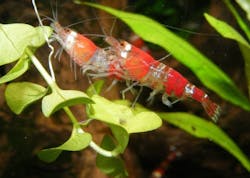Cocaine Found in Freshwater Shrimp in the U.K.
In the U.K., small amounts of cocaine, pesticides and other contaminants have been found in freshwater shrimp. According to a report by NPR, the drugs may be entering the water system through wastewater facilities.
At all the sites tested, cocaine was found in every sample. The study shares that the concentration of cocaine did not fluctuate between sites, and showed “widespread contamination,” according to NPR. The second most common substance found was lidocaine, a local anesthetic. According to NPR, the paper also found ketamine, alprazolam and diazepam at the sites sampled.
"We found that the most frequently detected compounds were illicit drugs, including cocaine and ketamine and a banned pesticide, fenuron," said Thomas MIller, King's College London environmental toxicologist. “For many of these, the potential for any effect is likely to be low.”
According to NPR, scientists found traces of drugs and pesticides in drinking water around the world in a year of research. Researchers are conducting a new study to determine how the chemicals may impact wildlife living in contaminated water.
"Pharmaceuticals and personal care products and pesticides and these types of illicit drugs have been detected in surface waters all over the world, because when we use them, our waste isn't always treated properly, and so they come out in rivers and streams," said Emma Rosi, an aquatic ecologist at the Cary Institute of Ecosystem Studies, to NPR.
King’s College London and the University of Suffolk researchers collected samples of Gammarus pulex shrimp in multiple locations in Suffolk county. According to NPR, the researchers tested for a range of pharmaceuticals, pesticides, and illicit drugs.
"We detect these compounds in the environment because people use them, and the things that we use in our everyday lives end up getting into the environment," Rosi told NPR. "What's very worrying is we don't know what the effects are, the ecological effects."
According to the U.S. EPA, pesticides can enter the system through runoff and other ways, and “whether these contaminants pose a health risk depends on how toxic the pesticides are, how much is in the water, and how much exposure occurs on a daily basis.”
"Such regular occurrence of illicit drugs in wildlife was surprising. We might expect to see these in urban areas such as London, but not in smaller and more rural catchments," said Leon Barron, a forensic scientist at King's who worked on this study.
